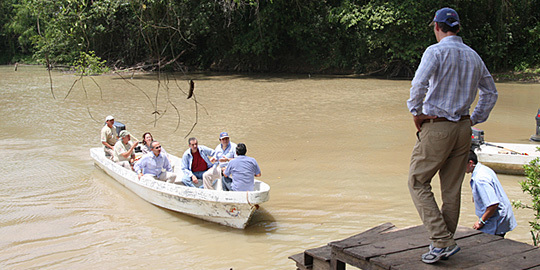Biodiversity and preservation of rain forests
Historical archive
Published under: Stoltenberg's 2nd Government
Publisher: Office of the Prime Minister
News story | Date: 10/04/2010 | Last updated: 12/04/2010
Norwegian Prime Minister Jens Stoltenberg and Mexican President Felipe Calderón today visited the Montes Azules nature reserve in Chiapas in southern Mexico. Set in the heart of the Lacadon jungle, the Reserve de la Biósfera Montes Azules is the largest undivided rain forest north of the Amazonas.
Norwegian Prime Minister Jens Stoltenberg and Mexican President Felipe Calderón today visited the Montes Azules nature reserve in Chiapas in southern Mexico. Set in the heart of the Lacadon jungle, the Reserve de la Biósfera Montes Azules is the largest undivided rain forest north of the Amazonas.

Norway's Prime Minister Jens Stoltenberg and Mexico's President Felipe Calderón today visited the Montes Azules nature reserve in Chiapas in southern Mexico. Photo: Office of the Prime Minister.
"It has been very informative to see that the preservation of tropical forests is vital in order to preserve animals and plants, and to protects the way of life of aboriginal peoples", Stoltenberg says.
The Montes Azules reserve has a unique biodiversity, and is vital for the preservation of the biodiversity in Mexico in general. Programmes to reduce environmental crime are central.
Deforestation in Mexico has been reduced, while deforestation in Chiapas has been extensive. Mexico is engaged in several efforts to reduce deforestation, and this has been a topic during Stoltenberg's visit.
Norway has been actively engaged in efforts against deforestation. Prime Minister Stoltenberg launched his government's climate and forest programme at the UN climate summit in Bali in December 2007. One central goal is to include the reduction of greenhouse gas emissions from deforestation in developing countries (REDD), in a new global climate agreement.
Another goal is to work to reduce greenhouse gas emissions from the forest sector in developing countries as soon as possible, even before a new climate agreement has been reached.
A third goal in Norway's climate and forest efforts is to preserve natural forests, due to their ability to store carbon. An overarching goal, in addition to the climate goals, is to contribute to the reduction of poverty and to secure a sustainable development in developing counties.
The Norwegian initiative is directed towards the preservation of all tropical forests. Economic support is already being given to several developing countries, mainly in cooperation with multilateral channels like the UN, the World Bank and regional development banks. A vital partner is also Brazil's Amazonas Fund.